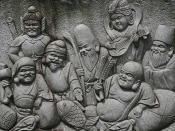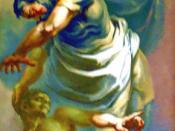The presence of evil and suffering in the world is a problem for those Christians who want to retain God's attributes of omnipotence, omniscience and benevolence and that God created the world 'out-of-nothing' (ex nihilo).
* David Hume's challenge: 'If God is able to something about evil and suffering yet chooses not to then God is malevolent. If God cannot do anything about evil and suffering then God is impotent.'
The word 'theodicy' is derived from the Greek words 'theos' (God) and 'dike' (justice). Theodicy is therefore a word used in Christian theology to show that God is righteous and just despite the presence of evil in the world.
Two types of Evil:
* Natural Evil - Events in the world which bring about suffering due to 'natural disasters' (E.g. Earthquakes, famine).
* Moral Evil - Actions which bring about unnecessary suffering in the world as a direct result of human activity (E.g.
Rape, murder).
* It should be noted that the concept of natural evil may be rejected if one considers that events such as earthquakes and famine have come about due to human mis-management of the environment. It is also questionable whether an earthquake causing the loss of human life is an 'evil' due to humans building homes on a geological fault line (E.g. The San Andreas fault which runs through San Francisco).
* Not all suffering is bad. If I feel pain when I put my hand on something hot this is good as it may stop me permanently damaging my hand by leaving it there.
Real Evil?
There is a theological position in Christian theology which argues that nothing happens in the world outside the will of God. Logically this means every event in the world is willed by God (although not caused by God).
* If every event in the world is willed by God then evil events are also willed by God.
* Evil events are designed to lead humans to greater faith in God (E.g. Job) or better conditions in the world ('And we know that in all things God works for the good of those who love him' (Romans 8:28)). The most powerful example of God working good through evil is Jesus dying for the sins of the world on the cross.
For a theodicy to be credible it must deal with real evil which logically must refer to those things not willed by God.
The Freewill Defence.
The Freewill Defence is based on the biblical teaching in Genesis 3:1-24 which states that God gave humans a choice as to whether they would obey or disobey God. Those who hold to the Freewill Defence often assume the events in Genesis 3 speak of an actual event in human history.
Key features of the Freewill Defence are:
* God created a perfect world (Genesis 1).
* Humans were created perfect and in the image of God (Genesis 1:26f).
* Humans were given freewill.
* God told humans not to eat from the tree of the knowledge of good and evil in the Garden of Eden.
* Humans were tempted by the serpent (Devil/Satan) to disobey God and as result they ate the forbidden fruit.
* When 'their eyes were opened' relationships between God, humanity and the world changed forever.
* God cursed the serpent, the woman and the ground as a result of their disobedience (Genesis 3:14-19).
* Adam and Eve were cast out of the garden symbolising a broken relationship between humans and God which has lasted today, as have the escalating effects of their disobedience ('For the creation was subject to frustration... We know the whole creation has been groaning... right up to the present time' (Romans 8:20f).
Due to its faithfulness to the biblical narrative the Freewill Defense is often the traditional answer of most Christians to the problem of evil and suffering..
Augustinian Theodicy
Augustine of Hippo (354-430CE) based his theodicy on the biblical teaching that God created the heavens and the earth perfect yet these had been corrupted when humans sinned (Genesis 1-3). As a consequence evil and suffering were not intended by God and so God cannot be held accountable for their presence in the world.
The key features of Augustine's theodicy are:
* God is perfect.
* God made a world free from imperfections.
* God did not create anything evil. Evil is a lack of goodness in something (privato bono).
* As God did not create evil there cannot be a completely evil being/thing. A totally evil being/thing simply would not exist.
* Evil comes from angels and human beings who choose to deliberately to turn away from God (The Freewill Defence).
* There is always the possibility of evil in the world since only God is perfect and unchanging.
* Everyone is guilty of sin since everyone was seminally present in the 'loins of Adam'.
* Everyone deserves to be punished ('Therefore, just as sin entered the world through one man, and death through sin, and in this way death came to all men, because all sinned...' (Romans 5:12).
* Natural evil has occurred as a result of human disobedience which destroyed the natural order ('Cursed is the ground because of you...' (Genesis 3:17)).
* God is justified in not intervening to stop suffering as we are receiving our just reward.
* God will save some people despite their sin. This shows God's mercy and love.
Critiques of the Freewill Defence and Augustinian Theodicy
* A literal reading of the Genesis account is unscientific. There has never been a time in the past when humanity was in such a perfect state.
* This is a symbolic account designed to simply teach us something fundamental about ourselves.
* How could evil come about in a perfect world. If there was a possibility that evil could occur then the world was not created perfect.
* If God knew things would go wrong why did God still create the world and humanity?
* It might be that even though God knew things would go wrong God still wanted to create us because of God's love for us. It should be noted that Christians believe God has done something through Jesus to restore the broken relationship between humans and God.
* Was it fair of God to give humanity such an important choice when they were morally undeveloped/naive?
* It might always be better for God to create a world where humans have real freedom to choose between good and evil rather than one where they had no choice or could only choose to do good.
The Irenaean Theodicy
Unlike Augustine, Irenaeus (130-202CE) believed God was partly responsible for the evil in the world. This was because he believed humans had been created in the 'image' of God (i.e. they had the ability to reason, knew morality, were intelligent), but were developing into God's likeness (perfection - see Genesis 1:26f)). Evil was a necessary by-product of humanity's spiritual journey.
The key features of Irenaeus' theodicy are:
* When God created the world it was always God intention that humans would be perfect.
* Being perfect is part of being created in the 'image of God'.
* Human perfection must develop through free choice.
* Since humans have freewill they have the potential to not only obey God but also disobey God.
* If humans were created perfect then there would be no genuine freewill. The world and everything in it must contain the potential for evil if there is to be genuine freedom of choice.
* Although God created everything this was not perfect. Furthermore, God does not impinge on our freedom to disobey God.
* Humans have used their freedom to choose suffering (evil).
* God cannot compromise our freewill by removing evil.
* The presence of evil in the world is not a punishment but simply a by-product of our 'bad choices'.
* We understand goodness (good) because we know what is evil (bad).
* In the future evil will be overcome and everyone will develop into God's likeness and will reach heaven.
* That everyone will eventually turn to God means evil at the moment is justified.
John Hick's Irenaean Theodicy
Hick believes that in order for humans to make real choices to follow God two things must be necessary:
* Humans must be given real choices. They cannot be 'programmed' only to do good.
* God must remain at a distance (epistemic distance) so that humans 'act naturally' and make free choices. If they are overwhelmed by the presence of God they will not do this.
Hick believes humans are to progress towards perfection. This is not only necessary to appreciate what goodness is but also fits into the evolutionary worldview.
The world cannot be a paradise. If there is no opportunity for things to go wrong then humans cannot make real choices which go against God's will and they will never struggle with 'difficult' choices. Furthermore, evil must arise from 'bad choices' otherwise humans will never learn from their mistakes.
Although the world is not designed to maximise pleasure and minimise pain it is designed for 'soul-making'. This must also carry on after death:
* If there was no life after death then people who did not have the opportunity to develop morally would thwart God's intention for creation.
* Only a future good in heaven can justify the evil people experience now.
Hick's theodicy ultimately leads to the notion of universalism (that all will be saved).
Critiques of the Irenaean Theodicy
* The end does not justify the means. Does it require the extent of suffering witnessed in the Holocaust?
* What about animals? Are they suffering because the universe is set up for the salvation of humans only?
* The idea that everyone will get to heaven seems unfair and also questions the value of any moral behaviour. It also contradicts the notion of divine justice as taught in scriptures (E.g. 'The they will go away to eternal punishment, but the righteous to eternal life' (Matthew 25:46)).
Process Theodicy.
Process Theology is based on the notion that all beings are in a process of development through having to make real choices. Through making choices we are learning what is good and who we are becoming. Process Theology applies this not only to human but also to God. As such, God is interacting with humanity and is learning from what happens in the world. Furthermore, as humans have real choices to make they are able to choose not to follow God.
The Process view of God differs from the traditional view in the following ways:
* God is not omnipotent. God cannot impose God's will onto humanity. God is limited by what humanity has decided to do.
* God is not omniscient. God does not know the future which has yet to be realised.
* God did not create the world 'out-of-nothing' (ex nihilo) but formed this world from pre-existent matter.
* God was limited in the kind of world which could be 'made' due to limitations in this pre-existent matter.
* Matter clearly had the capacity to turn away from God.
* That matter has turned away from God means there is evil and suffering in the world.
* God can only 'lure' matter towards that which God believes is the best possible future.
* The ability to respond to God's lure depends on how receptive matter is towards God.
* God understands and suffers when evil is committed in the world.
Critiques of Process Theodicy
* If God is always learning then God's attributes may not be eternal. God may seem to be a good God now but in the future may turn to evil.
* Due to God's limited omnipotence there is no guarantee that all will be well in the universe in the end.
* It is not a theodicy due to the fact that it denies the traditional view of God.


